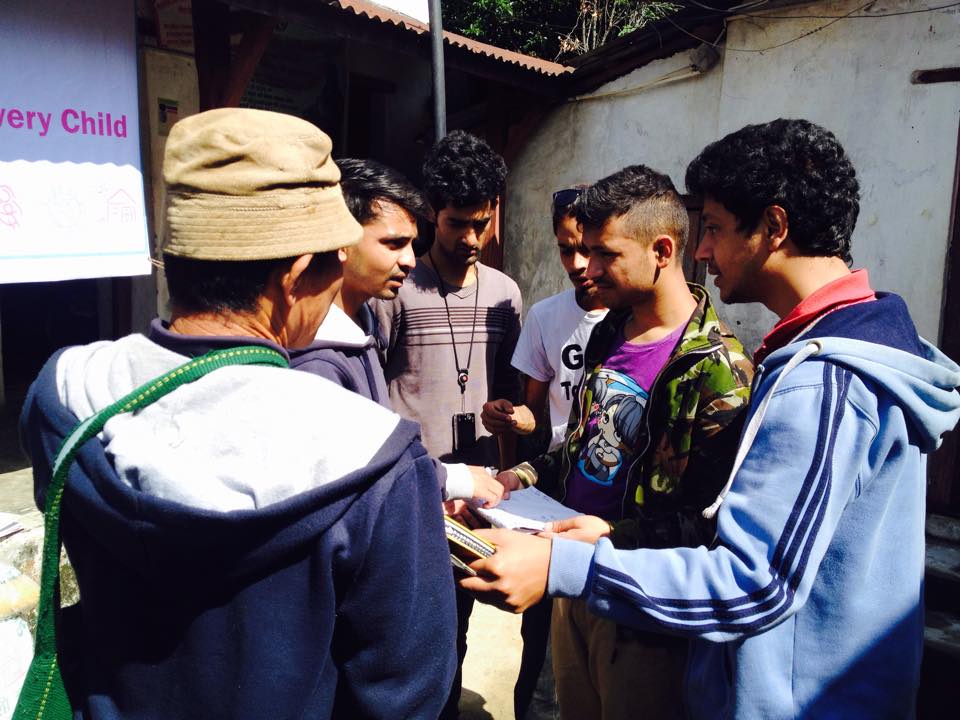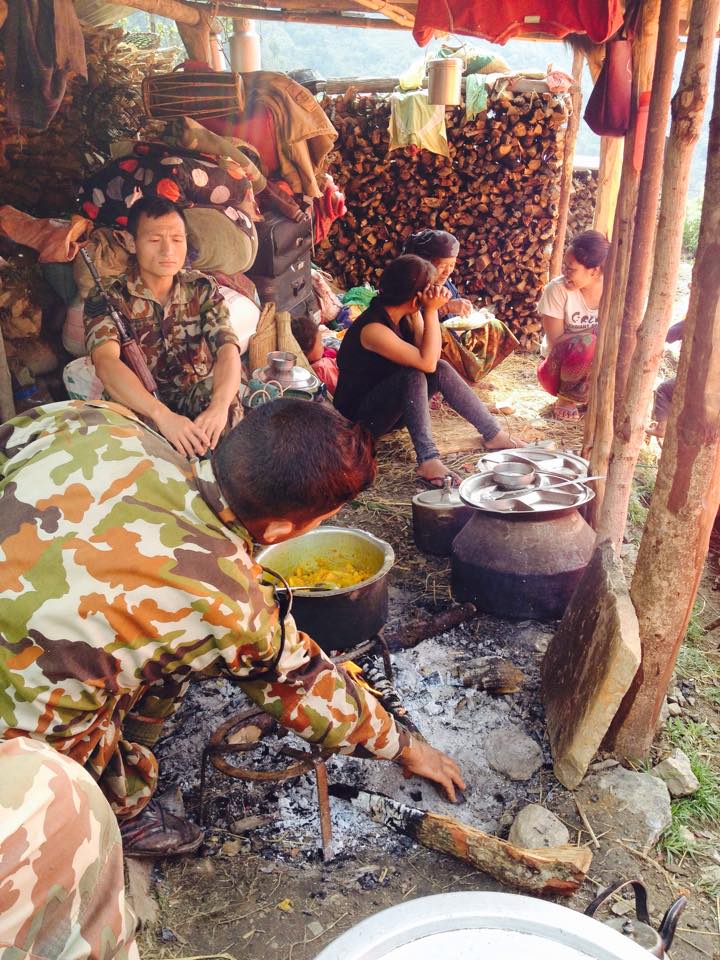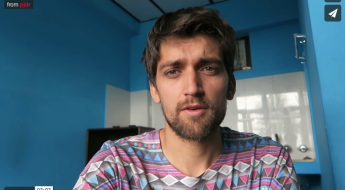
This is the story Shadab sent us last night. He has visited some of the destroyed villages and helped out about 30 families. Shadab Khan is a student from India who currently studies medicine in Nepal. Read his story.
For a person who’s been residing in Nepal for the past four years, I was ironically across the border in India when the earthquake struck. Since we were relatively far off the epicentre of the quake, my initial assessment was that it was only a mild tremor that Nepal and this area in general is subjected to from time to time, due to it’s location above the seismically active tectonic plates. I don’t think i’ll ever make a more inaccurate judgement ever. The first signs of a major disaster having happened was when i crossed the border back into Nepal and i received a call from my folks back home who were in a state of total hysteria. As soon as i hung up on them, my screen beamed again to show my sister calling from Pittsburgh. It was 2pm in the afternoon here, she should be fast asleep by all rights. I assured her too, but something was amiss; it was obvious by the tone of voices around me. soon enough telephones lines began to jam and vehicles began piling up on the roads as people rushed to watch the news on television in nearby shops or to discuss in general with anyone who had something to say. The magnitude of the tragedy was lost on nobody by then and this was only the beginning.
Meanwhile, after the initial round of aftershocks subsided, i decided to travel to Pokhara with a friend who was part of the Nepal SoS Society. His friends in Pokhara had mobilised a relief convoy to deliver aid to the district of Lamjung. This was the epicentre of the earthquake and food, tents, blankets were in dire need in villages that were located in the district. We reached Pokhara early in the morning and spent the entire morning and early afternoon visiting donors and stockpiling supplies to be delivered. One person in particular, Hiu Chang from Hong Kong, deserves a special mention as he alone contributed goods worth in excess of USD 300, mostly medicines. It was heart warming to see such utmost and absolute generosity from people who could’ve used that money to book themselves a ticket on the first flight out of a country in chaos, but had chosen instead to use it for a nobler cause and had donated to help a people in desperate need of help from all and any quarter. Anyways, our supplies gathered eight of us set out from Pokhara to Lamjung which falls roughly halfway on the way to Kathmandu and is 80 klicks from either city. We spent the night in a local hospital. There was an aftershock that registered 4.7 on the Richter Scale early on the following morning that jolted us awake, a reminder of just how delicate and desperate the situation was. Outside a grey, angry sky promised rain the entire day but these were going to be the least of our troubles that day. Upon learning of our visit there, the police and administration were adamant that any relief goods and supplies were mandated to be handed over to district CDO. Normally this would not have been a problem but with allegations of rampant corruption and hoading, trusting the administration to do the right thing was hard to digest. Furthermore, to compound the problem only government vehicles were allowed to carry goods and aid to the affected areas and we could find no private transporter to hire. After two hours of haggling and argueing, the CDO allowed three members of our party to travel along in the tractor that was to carry our relief material and brusquesly said that if the rest of wanted to go to the affected villages, we would have to trek up to them.
Our target was to reach a village called Gauda located centrally in Lamjung district. It had the only hospital, called PHP(Public Health Post) that catered to the region. The resident doctor there is senior of mine from college and he had sent us a list of exactly what was required there. To reach Gauda, one must either take a ride in a tractor or mini-bus that winds its way along a mountain mud track, for hours. It is so thin and narrow that only one vehicle can travel on it at a time and incoming traffic from the other direction will mean that one of the two will have to back up till a place where the track is wide enough to allow them to squeeze through. Even the locals refuse to use, unless one is too infirm to walk. Those of us who had decided to hike up had to leave immediately as it takes a good six hours of trekking to reach Gauda and it was already past midday. We figured that if we pushed hard we ought to make it there by six in the evening. Another false assumption, as it took me and the group eight hours to reach our destination, trekking the last leg of the journey in darkness with cellphone flashlights as the only source of illumination. To say it was gruelling and ardous is an understatement. The tractor had reached only an hour before us and the first thing that needed to be done was to unload the supplies as the driver wanted to leave at first light the next day. The villagers had been expecting us and willing hands came forward to help with the unloading and everything was placed in the premises of the PHP. Walking through the village, my first impression was that maybe we had reached the wrong place. Gauda seemed perfectly okay. No houses had collapsed, children played in the verandah of their houses, and despite the late hour even the few shops were open. There was nothing to suggest that this place had been the epicentre of the quake. But that lasted only a few minutes as over a cup of tea, locals told of how surrounding villages were completed destroyed. To drive the message home, we were told that the doctor on whose behalf we had come all this way was in another village five hours away to care for the wounded and would not be returning tonight.
The next day we hiked down to a village named Simal, about two hours away. Here, one was left in no doubt just how horrfying the earthquake must have been. Hardly a house was left standing, and the few that were upright were so cracked and crooked as to render them inhospitable because any one of the frequent aftershocks would have sent them tumbling down. What was once a village was now just a mass of rubble. Electricity poles were down so solar panels provided the only source of power. The entire populace was residing in orange tarpaulin tents that had been set up in the field, far from any structure that might collapse and cause further injury. Luckily though at the time of the eathquake, most of the villagers had been out in the fields so the number of casualties was low. We did a general survey of the place and made notes of the families most badly affected. Although we carried a good amount of supplies, distributing them would have to be calculated, larger families would receive more food and blankets and a tent, than say another family that had managed to salvage something from the rubble of their houses. This was my first time out doing something of this nature, and i have to say that deciding if one man tragedy was greater than his neighbour’s left me and the rest of my group in really bad state of mind. But it had to be done and this was only the first village. Our notes made, we asked the families concerned to come to Gauda in the evening and collect their supplies. From there on, we left for the next village another hour away and same exercise was carried out. In the next village was the first sign that the gvernment had taken cognisance of the disaster and had sent help, little as it was. Here were three army personnel who had been taking care of the villagers.
They had been there for the better part of a week and had been cooking and caring for the wounded. But their food was running low by then and they were candid enough to say they did not expect any assisstance from the authorities for a few days. To make the food last as long as it would, the armymen were down to eating only one meal per day. That too was just rice and the most basic form of lentils. It was in this village, whose name I cannot spell as it is named in the local Gurung language, that we decided that to hand out a major share of our supplies. Whereas the other villages we had passed were located on terrace farms, this one seemed to cling precariously to the edge of the mountain it was loacted on. As such, because of the scarcity of space, the rescue tents here were over-crowded and the number of wounded were comparatively more and it was furthest from Gauda. About four hours away, any relief that did reach Gauda by road would take a long time coming here. We repeated the same exercise here, took notes asked the concerned families to reach the PHP by evening. One of the army personnel promised to come along with the villagers to help carry the load and also to ensure that no quarrels broke out. Our work done for now, we returned back to the PHP and got about arranging the supplies as it were to be distributed. Fifteen packets of instant noodles, biscuits and a sleeping mat wrapped in one blanket to given to one family. Two of these if the family was big and had children. The rice, lentils and vegetables we carried could not be distributed individually but would be given out in bulk to the village headman so that it could be shared by all the members of that village. The medical supplies were to given to the hospital as it seemed the sensible thing to do. But basic medication such as ORS and Diarrhoea tablets would be given out. However, we were informed that because of the late hour, the distribution would have to be carried out tomorrow. That meant everthing would have to be unpacked and placed inside the main PHP building as the chance of rain was too great to risk leaving it out in the open. A good thing we got this done, as that night the sky raged and a furious hailstorm ensured. In the midst of this gale when i was thinking just how cold and miserable i was, i thought of those people down there, entire villages living in tents. Men, women, children, the old, the infirm and the wounded, everyone of them huddled together surrounded by the ruins that used to be their abodes. It was not the most sobering thought to go to sleep with.
The next day, as promised, the people of Simal and the other villages began to tickle into Gauda. Some of them still wearing the clothes that were wet from the storm last night. It took about an hour for everyone to gather around and for us to re-pack the supplies as they were to be given out. As promsed one of the army personnel was with the villagers. The first thing to do was to give a short talk on how to prevent the spread of communicable diseases and ensure personal hygiene. That done, without further ado, the headmen or pradhan in the local language came forward and together with one member from our group we would call out members of each family to come forward and receive their share. That done their names would be ticked off and the next name called out. Altogether about thirty families from three villages received the individual handouts. As stated earlier the rice and lentils were divided among the village headmen to be shared by all. I cannot express accurately how gratifying it is to be of help to people in dire need of it, yet it leaves a really bad taste in your mouth to turn away those who asked if they could have more but had been designated to receive less. It is a constant reminder of just how devastated this community, which had been living hand to mouth before, had been reduced to. I’m glad i was of some help, but in the larger scheme of things, our effort was less than a drop in the ocean. The government, corrupt and under-staffed as it is, the NGOs, other relief organisations have been working round the clock. But it is not enough and there are too many people, too many who are dead, too many who are wounded and too many who are hungry and cold and shelterless. And too less is being done for them.










Leave a Comment